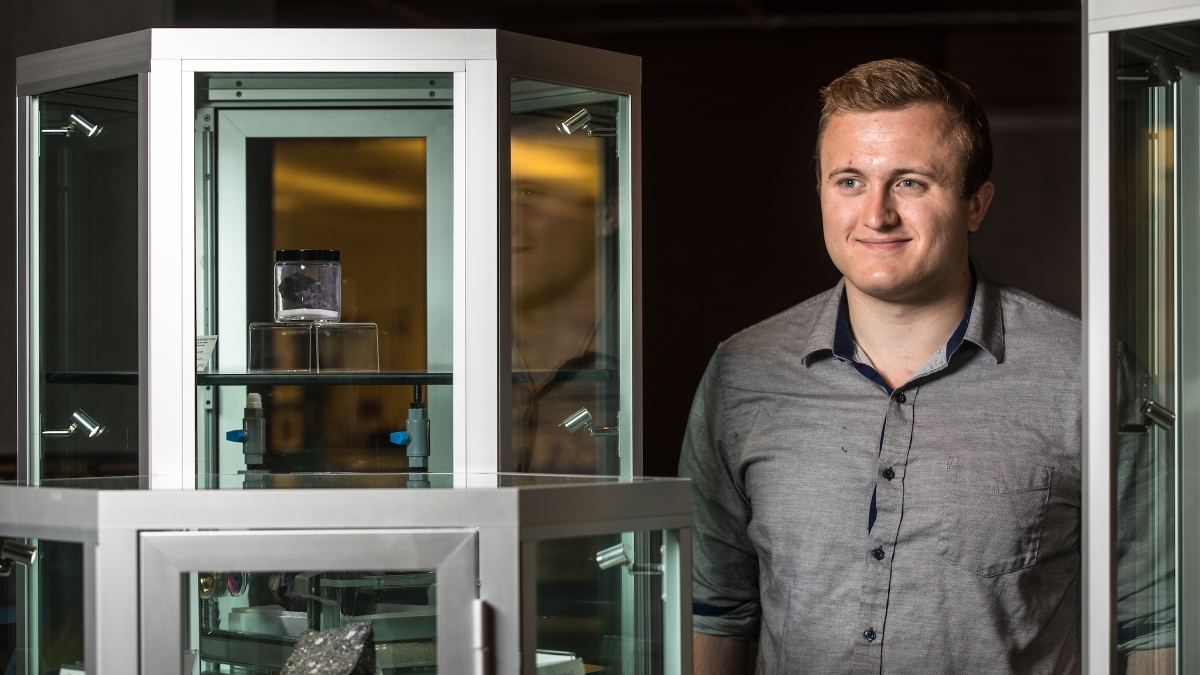Editor’s note: This is part of a series of profiles for spring 2017 commencement. See more graduates here.
When the Apollo astronauts trained in Arizona, Ron Greeley, one of the founders of planetary geology and the father of Arizona State University’s space program, helped educate them about geology.
Early astronauts tended to be fighter jocks who weren’t terribly interested in rocks. Greeley succeeded in educating them to be more sophisticated than describing rocks as big or little, and how to differentiate between an interesting rock and a more prosaic sample.
Arizona State University student Garrett Fleetwood, about to graduate with a degree in mechanical engineering from the School for Engineering of Matter, Transport & Energy in the Ira A. Fulton Schools of Engineering and another degree in economics, wrote an undergraduate thesis tackling that exact problem.
The Corvallis, Oregon, native invented a computerized process to identify rock samples and put them into categories. His approach can learn from human experts and extrapolate their decision processes to identify interesting rock samples.
The thesis — “A Concept for Using Superformula and Information Theory to Identify and Prioritize Interesting Objects in Autonomous Exploration” — may someday help create a geologic scanning instrument used in space exploration.
Q: What was your “aha” moment, when you realized you wanted to study the field you majored in?
A: I’ve always known I was destined for engineering. I was the sci-fi nerd: "Let’s make this happen." ... The thing that really gets me is the idea of establishing a permanent base on the moon or Mars. That’s just something I’ve always wanted to see happen. I can help.
Q: What’s something you learned while at ASU — in the classroom or otherwise — that surprised you, that changed your perspective?
A: One of the fun things you learn about engineering and the sciences in general is that the more you know, the less you know. You realize that really quickly.
Q: Why did you choose ASU?
A: It was the scholarship.
Q: What was your favorite spot on campus, whether for studying, meeting friends or just thinking about life?
A: College Avenue Commons. It’s a really nice building.
Q: What are your plans after graduation?
A: Grad school.
Q: If someone gave you $40 million to solve one problem on our planet, what would you tackle?
A: There’s so much to choose from. And that’s really not a lot of money. It used to be. I’m going to go generic and say world hunger. You could probably make a dent with a distribution center or something.
More Science and technology

ASU professor breeds new tomato variety, the 'Desert Dew'
In an era defined by climate volatility and resource scarcity, researchers are developing crops that can survive — and thrive — under pressure.One such innovation is the newly released tomato variety…

Science meets play: ASU researcher makes developmental science hands-on for families
On a Friday morning at the Edna Vihel Arts Center in Tempe, toddlers dip paint brushes into bright colors, decorating paper fish. Nearby, children chase bubbles and move to music, while…

ASU water polo player defends the goal — and our data
Marie Rudasics is the last line of defense.Six players advance across the pool with a single objective in mind: making sure that yellow hydrogrip ball finds its way into the net. Rudasics, goalkeeper…


